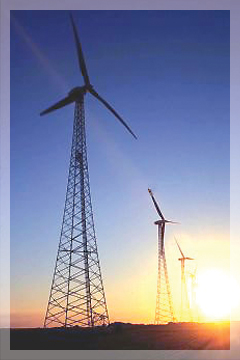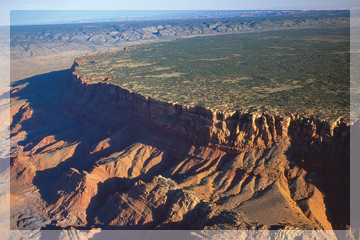The West

Wind turbines offer a viable means to produce clean and renewable energy, a key goal of The Energy Foundation’s Western Power Campaign. Photo courtesy of the Energy Foundation.
The vast and majestic North American West faces unprecedented pressures from developers and the coal, timber, oil, and gas industries. As one of the largest funders of environmental organizations in the West, the Hewlett Foundation works to protect the region’s public landscapes, which include the largest intact ecosystems in eleven western states, comprising nearly half their total land. The Foundation also strongly supports work to protect private land through public funding.
In 2007, we made western conservation grants in five strategic areas:
Preserving wilderness. The Foundation supports community organizations in the United States and Canada that are working to permanently protect the last remaining wild spaces in the West.
The Foundation’s work in Canada’s Great Bear Rainforest and the Boreal forests has resulted in tremendous conservation gains. An extremely important site for biodiversity protection, Great Bear now has five million acres designated as wilderness and 16 million acres managed for sustainability rather than extraction of resources—the result of more than a decade of work and investment by foundations and conservation groups.
Supporting public finance for conservation of private land. The Program relies on two strategies to help land trusts expand their scale: increase the public funds available for private conservation, and enable western land trusts to make better use of new public and private funding. In 2007, our grantees helped generate more than $380 million in new public funding for land conservation in the West.
Western water reform. To ensure that enough water is available to keep natural ecosystems intact, the Program supports efforts to reform state water laws in the West and improve the operation of dams that are subject to review by the Federal Energy Regulatory Commission. The interventions of our grantees in dam relicensing hearings before the FERC helped increase river water flows and protect 400 miles of fish spawning habitat.
Supporting responsible energy development. Governors from Montana to New Mexico are calling for the protection of special places that should be off limits to oil and gas developers. Despite difficult challenges such as record-setting numbers of new oil and gas permits on public lands, our grantees made substantial progress with state policymakers. New laws provide for more rigorous oversight of wastewater reclamation and reduce damage to private property as a result of the exercising of mineral and drilling rights.
In early 2007, the largest energy utility in Texas, TXU Corporation, announced that it would cancel construction of eight proposed coal-fired power plants, fight for a cap on carbon emissions, and make significant new investments in energy efficiency and renewable energy. This unprecedented decision was the result of the work of many Foundation grantees and involved an integrated strategy of community organizing, administrative and judicial advocacy, research, and public education. This landmark decision will ensure that we avoid over 100 million tons of carbon dioxide emissions a year.
Also in 2007, five western states (Arizona, New Mexico, California, Oregon, and Washington) formed the Western Climate Initiative and agreed to set an aggressive regional climate target based on carbon reductions that will be the equivalent of removing 44 million new cars from the road.
Engaging a broader range of constituencies in environmental protection. In 2007, we continued our grantmaking aimed at strengthening environmental leadership among groups that have been historically underrepresented in environmental policymaking—particularly Latinos, African Americans, and Asians. Foundation grantees helped secure a landmark plan to drastically reduce air pollution from diesel trucks at the Los Angeles and Long Beach ports. This will result in an 85 percent drop in truck-related pollution and significantly reduce pollution-related health risks for nearby residents, whose rate of respiratory disease is far greater than the general population’s.
Grantees working in the San Joaquin Valley helped strengthen rules to reduce emissions that create ozone. The effort also helped the Central Valley’s environmental community more effectively inform public decisionmaking on clean-air policy.
The West Grants authorized in 2007.
2008 Goals
- Protect 43 million acres of Boreal forest wilderness
- Designate four new wilderness areas in the western United States
- Begin crafting an agreement among timber, fishing, and environmental interests on management of the Tongass National Forest
- Raise $300 million in public funding for conservation of private land
- Strengthen rules governing the use of off-road vehicles on public lands
- Help raise funding for the Clean Truck Plan and the other key Clean Air Action Plan strategies in the Los Angeles area
- Support the passage of strict emissions regulations for diesel trucks in California
- Secure strong environmental protections for oil and gas development areas, especially in Colorado, Wyoming, and New Mexico
- Help the Western Climate Initiative develop a registry to track greenhouse gas emissions
- Develop standards to ensure that a growing percentage of statewide electricity comes from renewable sources
- Block or delay the construction of conventional coal plants and promote clean alternatives
- Expand energy-efficiency standards to more states throughout the country
For more information, please visit the Foundation Web site.




